CRM in Hotel: Integrating E-CRM for Customer Retention and Loyalty
VerifiedAdded on 2020/06/03
|29
|3942
|289
Report
AI Summary
This report investigates the integration of Customer Relationship Management (CRM) with Electronic CRM (E-CRM) within the hotel industry, using Grand Hyatt Hong Kong as a case study. The study examines the concepts of CRM and E-CRM, customer-facing CRM practices, leisure travellers' perceptions of these practices, and hotel selection patterns. It assesses the effectiveness of CRM and E-CRM in generating customer retention and positive word-of-mouth. The research employs a qualitative methodology, including interviews with hotel managers, and analyzes themes related to customer experience, CRM department empowerment, techniques for building customer relationships, and the effectiveness of e-CRM practices. The findings reveal key factors influencing hotel selection, challenges in CRM-to-e-CRM integration, and strategies to enhance e-CRM effectiveness. The report concludes with recommendations for improving customer retention and loyalty through strategic CRM and E-CRM implementation.
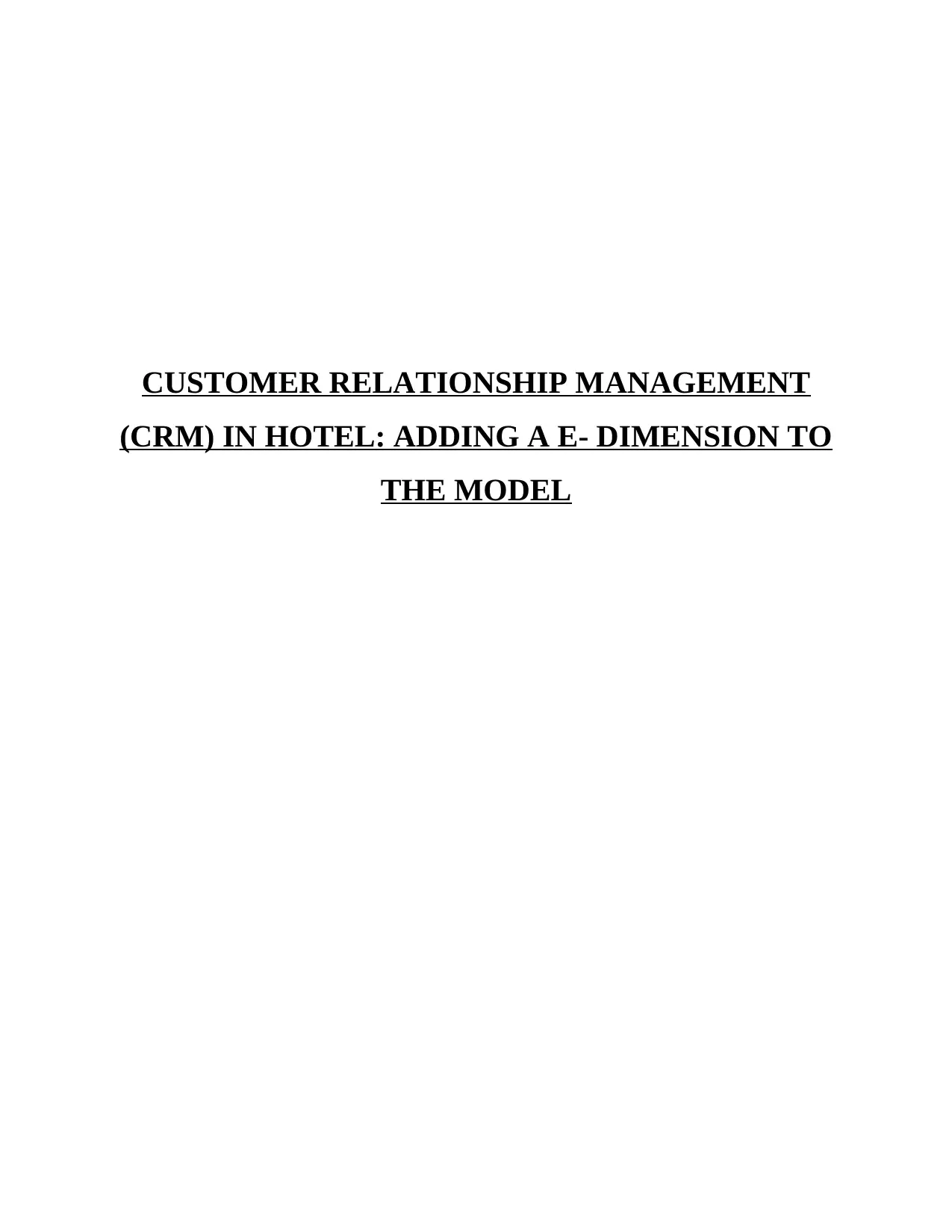
CUSTOMER RELATIONSHIP MANAGEMENT
(CRM) IN HOTEL: ADDING A E- DIMENSION TO
THE MODEL
(CRM) IN HOTEL: ADDING A E- DIMENSION TO
THE MODEL
Paraphrase This Document
Need a fresh take? Get an instant paraphrase of this document with our AI Paraphraser
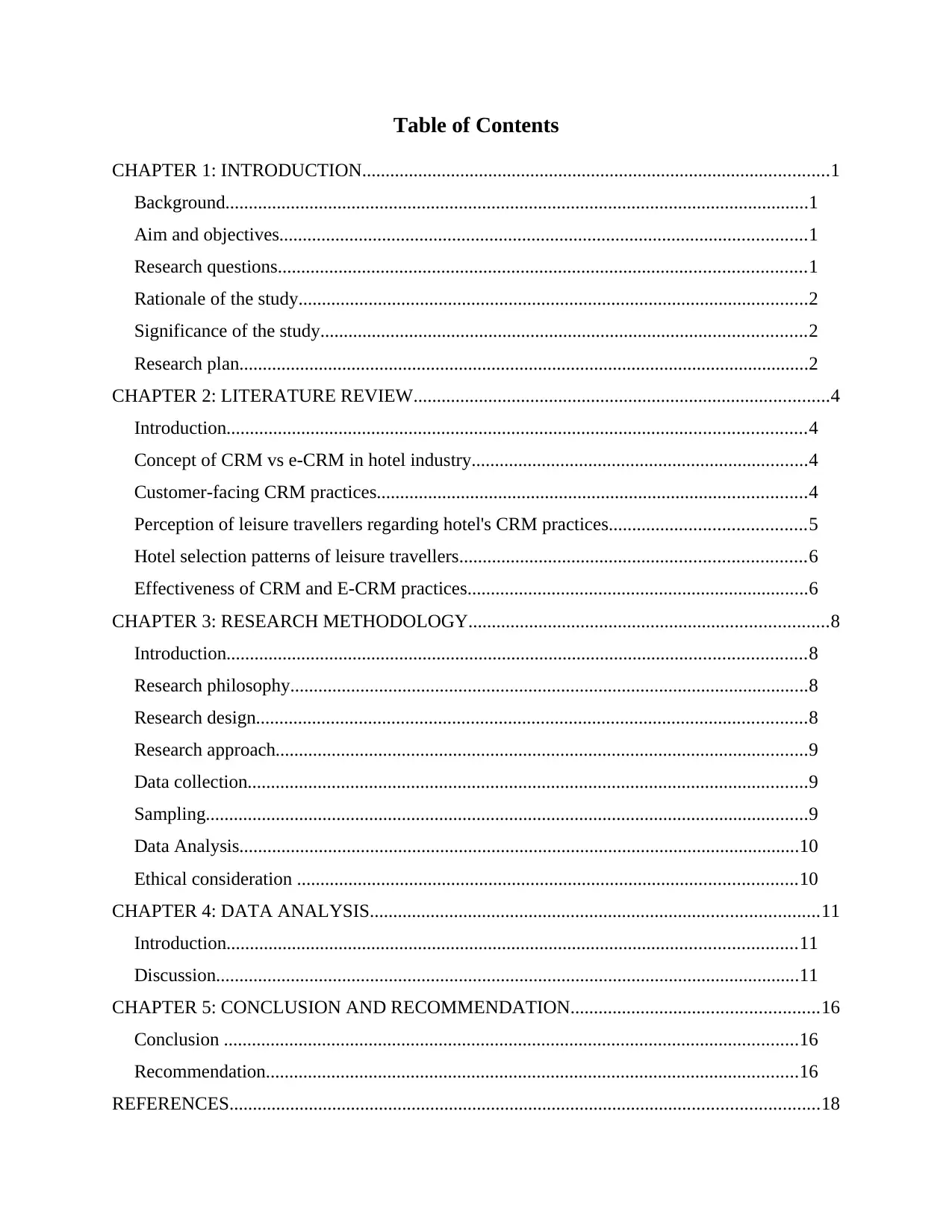
Table of Contents
CHAPTER 1: INTRODUCTION....................................................................................................1
Background.............................................................................................................................1
Aim and objectives.................................................................................................................1
Research questions.................................................................................................................1
Rationale of the study.............................................................................................................2
Significance of the study........................................................................................................2
Research plan..........................................................................................................................2
CHAPTER 2: LITERATURE REVIEW.........................................................................................4
Introduction............................................................................................................................4
Concept of CRM vs e-CRM in hotel industry........................................................................4
Customer-facing CRM practices............................................................................................4
Perception of leisure travellers regarding hotel's CRM practices..........................................5
Hotel selection patterns of leisure travellers..........................................................................6
Effectiveness of CRM and E-CRM practices.........................................................................6
CHAPTER 3: RESEARCH METHODOLOGY.............................................................................8
Introduction............................................................................................................................8
Research philosophy...............................................................................................................8
Research design......................................................................................................................8
Research approach..................................................................................................................9
Data collection........................................................................................................................9
Sampling.................................................................................................................................9
Data Analysis........................................................................................................................10
Ethical consideration ...........................................................................................................10
CHAPTER 4: DATA ANALYSIS................................................................................................11
Introduction..........................................................................................................................11
Discussion.............................................................................................................................11
CHAPTER 5: CONCLUSION AND RECOMMENDATION.....................................................16
Conclusion ...........................................................................................................................16
Recommendation..................................................................................................................16
REFERENCES..............................................................................................................................18
CHAPTER 1: INTRODUCTION....................................................................................................1
Background.............................................................................................................................1
Aim and objectives.................................................................................................................1
Research questions.................................................................................................................1
Rationale of the study.............................................................................................................2
Significance of the study........................................................................................................2
Research plan..........................................................................................................................2
CHAPTER 2: LITERATURE REVIEW.........................................................................................4
Introduction............................................................................................................................4
Concept of CRM vs e-CRM in hotel industry........................................................................4
Customer-facing CRM practices............................................................................................4
Perception of leisure travellers regarding hotel's CRM practices..........................................5
Hotel selection patterns of leisure travellers..........................................................................6
Effectiveness of CRM and E-CRM practices.........................................................................6
CHAPTER 3: RESEARCH METHODOLOGY.............................................................................8
Introduction............................................................................................................................8
Research philosophy...............................................................................................................8
Research design......................................................................................................................8
Research approach..................................................................................................................9
Data collection........................................................................................................................9
Sampling.................................................................................................................................9
Data Analysis........................................................................................................................10
Ethical consideration ...........................................................................................................10
CHAPTER 4: DATA ANALYSIS................................................................................................11
Introduction..........................................................................................................................11
Discussion.............................................................................................................................11
CHAPTER 5: CONCLUSION AND RECOMMENDATION.....................................................16
Conclusion ...........................................................................................................................16
Recommendation..................................................................................................................16
REFERENCES..............................................................................................................................18

⊘ This is a preview!⊘
Do you want full access?
Subscribe today to unlock all pages.

Trusted by 1+ million students worldwide
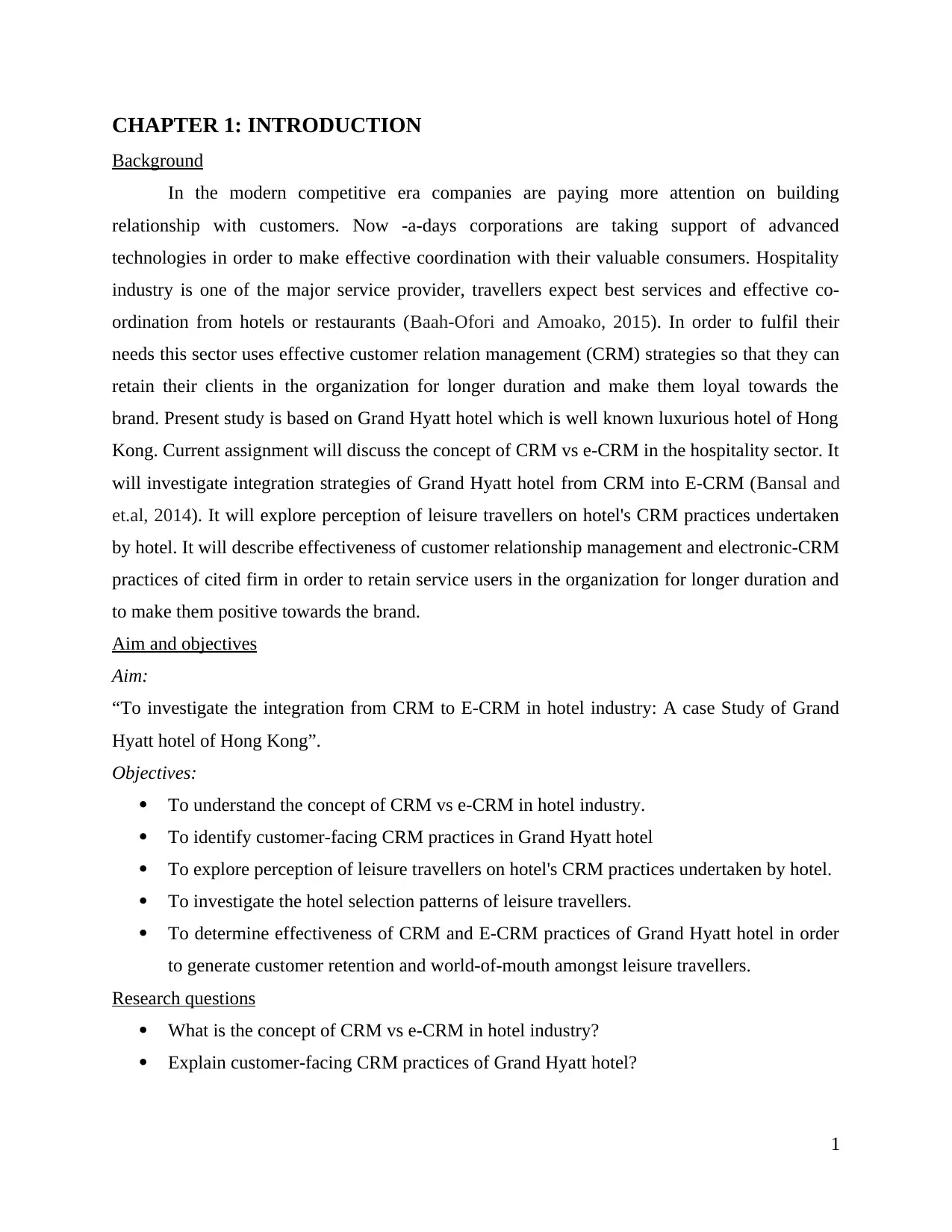
CHAPTER 1: INTRODUCTION
Background
In the modern competitive era companies are paying more attention on building
relationship with customers. Now -a-days corporations are taking support of advanced
technologies in order to make effective coordination with their valuable consumers. Hospitality
industry is one of the major service provider, travellers expect best services and effective co-
ordination from hotels or restaurants (Baah-Ofori and Amoako, 2015). In order to fulfil their
needs this sector uses effective customer relation management (CRM) strategies so that they can
retain their clients in the organization for longer duration and make them loyal towards the
brand. Present study is based on Grand Hyatt hotel which is well known luxurious hotel of Hong
Kong. Current assignment will discuss the concept of CRM vs e-CRM in the hospitality sector. It
will investigate integration strategies of Grand Hyatt hotel from CRM into E-CRM (Bansal and
et.al, 2014). It will explore perception of leisure travellers on hotel's CRM practices undertaken
by hotel. It will describe effectiveness of customer relationship management and electronic-CRM
practices of cited firm in order to retain service users in the organization for longer duration and
to make them positive towards the brand.
Aim and objectives
Aim:
“To investigate the integration from CRM to E-CRM in hotel industry: A case Study of Grand
Hyatt hotel of Hong Kong”.
Objectives:
To understand the concept of CRM vs e-CRM in hotel industry.
To identify customer-facing CRM practices in Grand Hyatt hotel
To explore perception of leisure travellers on hotel's CRM practices undertaken by hotel.
To investigate the hotel selection patterns of leisure travellers.
To determine effectiveness of CRM and E-CRM practices of Grand Hyatt hotel in order
to generate customer retention and world-of-mouth amongst leisure travellers.
Research questions
What is the concept of CRM vs e-CRM in hotel industry?
Explain customer-facing CRM practices of Grand Hyatt hotel?
1
Background
In the modern competitive era companies are paying more attention on building
relationship with customers. Now -a-days corporations are taking support of advanced
technologies in order to make effective coordination with their valuable consumers. Hospitality
industry is one of the major service provider, travellers expect best services and effective co-
ordination from hotels or restaurants (Baah-Ofori and Amoako, 2015). In order to fulfil their
needs this sector uses effective customer relation management (CRM) strategies so that they can
retain their clients in the organization for longer duration and make them loyal towards the
brand. Present study is based on Grand Hyatt hotel which is well known luxurious hotel of Hong
Kong. Current assignment will discuss the concept of CRM vs e-CRM in the hospitality sector. It
will investigate integration strategies of Grand Hyatt hotel from CRM into E-CRM (Bansal and
et.al, 2014). It will explore perception of leisure travellers on hotel's CRM practices undertaken
by hotel. It will describe effectiveness of customer relationship management and electronic-CRM
practices of cited firm in order to retain service users in the organization for longer duration and
to make them positive towards the brand.
Aim and objectives
Aim:
“To investigate the integration from CRM to E-CRM in hotel industry: A case Study of Grand
Hyatt hotel of Hong Kong”.
Objectives:
To understand the concept of CRM vs e-CRM in hotel industry.
To identify customer-facing CRM practices in Grand Hyatt hotel
To explore perception of leisure travellers on hotel's CRM practices undertaken by hotel.
To investigate the hotel selection patterns of leisure travellers.
To determine effectiveness of CRM and E-CRM practices of Grand Hyatt hotel in order
to generate customer retention and world-of-mouth amongst leisure travellers.
Research questions
What is the concept of CRM vs e-CRM in hotel industry?
Explain customer-facing CRM practices of Grand Hyatt hotel?
1
Paraphrase This Document
Need a fresh take? Get an instant paraphrase of this document with our AI Paraphraser
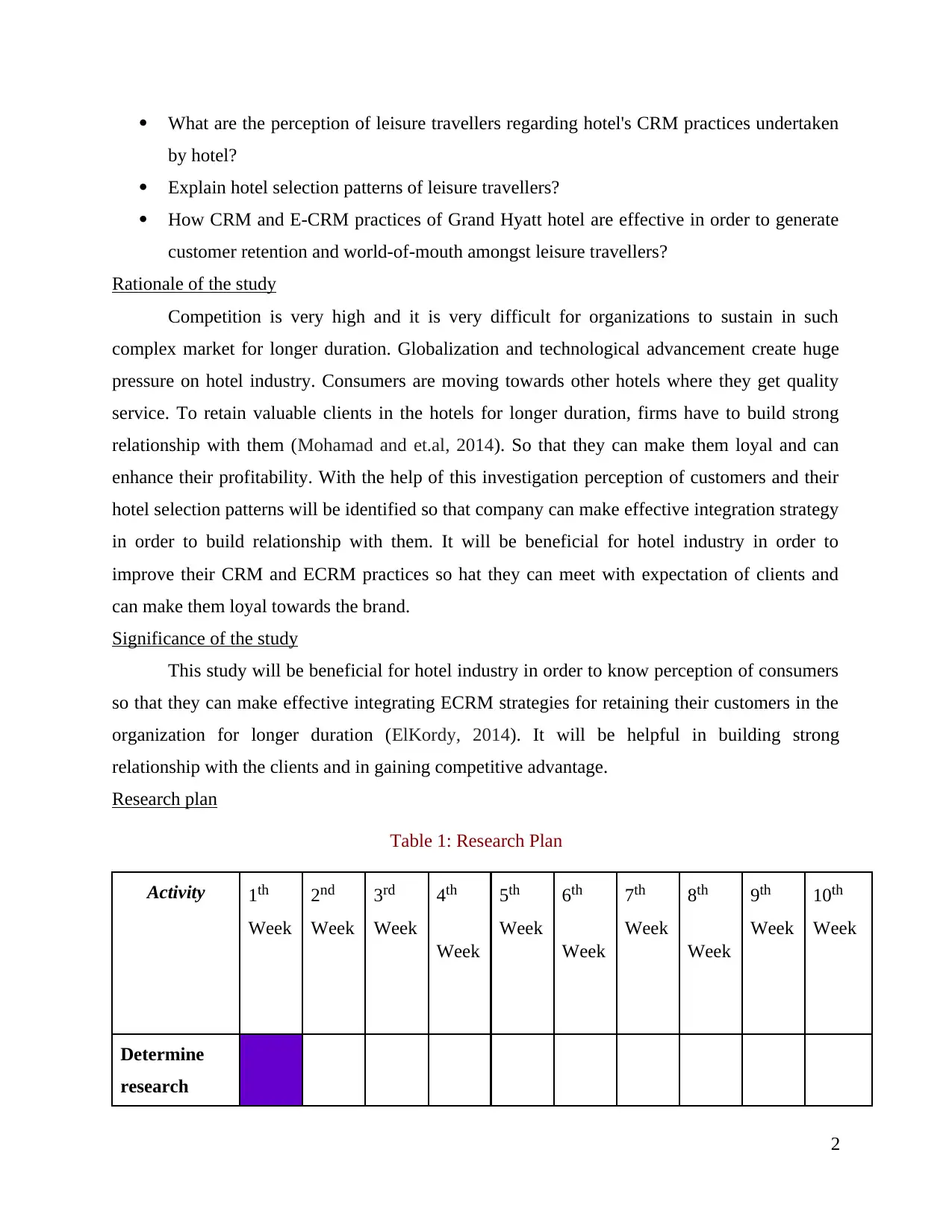
What are the perception of leisure travellers regarding hotel's CRM practices undertaken
by hotel?
Explain hotel selection patterns of leisure travellers?
How CRM and E-CRM practices of Grand Hyatt hotel are effective in order to generate
customer retention and world-of-mouth amongst leisure travellers?
Rationale of the study
Competition is very high and it is very difficult for organizations to sustain in such
complex market for longer duration. Globalization and technological advancement create huge
pressure on hotel industry. Consumers are moving towards other hotels where they get quality
service. To retain valuable clients in the hotels for longer duration, firms have to build strong
relationship with them (Mohamad and et.al, 2014). So that they can make them loyal and can
enhance their profitability. With the help of this investigation perception of customers and their
hotel selection patterns will be identified so that company can make effective integration strategy
in order to build relationship with them. It will be beneficial for hotel industry in order to
improve their CRM and ECRM practices so hat they can meet with expectation of clients and
can make them loyal towards the brand.
Significance of the study
This study will be beneficial for hotel industry in order to know perception of consumers
so that they can make effective integrating ECRM strategies for retaining their customers in the
organization for longer duration (ElKordy, 2014). It will be helpful in building strong
relationship with the clients and in gaining competitive advantage.
Research plan
Table 1: Research Plan
Activity 1th
Week
2nd
Week
3rd
Week
4th
Week
5th
Week
6th
Week
7th
Week
8th
Week
9th
Week
10th
Week
Determine
research
2
by hotel?
Explain hotel selection patterns of leisure travellers?
How CRM and E-CRM practices of Grand Hyatt hotel are effective in order to generate
customer retention and world-of-mouth amongst leisure travellers?
Rationale of the study
Competition is very high and it is very difficult for organizations to sustain in such
complex market for longer duration. Globalization and technological advancement create huge
pressure on hotel industry. Consumers are moving towards other hotels where they get quality
service. To retain valuable clients in the hotels for longer duration, firms have to build strong
relationship with them (Mohamad and et.al, 2014). So that they can make them loyal and can
enhance their profitability. With the help of this investigation perception of customers and their
hotel selection patterns will be identified so that company can make effective integration strategy
in order to build relationship with them. It will be beneficial for hotel industry in order to
improve their CRM and ECRM practices so hat they can meet with expectation of clients and
can make them loyal towards the brand.
Significance of the study
This study will be beneficial for hotel industry in order to know perception of consumers
so that they can make effective integrating ECRM strategies for retaining their customers in the
organization for longer duration (ElKordy, 2014). It will be helpful in building strong
relationship with the clients and in gaining competitive advantage.
Research plan
Table 1: Research Plan
Activity 1th
Week
2nd
Week
3rd
Week
4th
Week
5th
Week
6th
Week
7th
Week
8th
Week
9th
Week
10th
Week
Determine
research
2
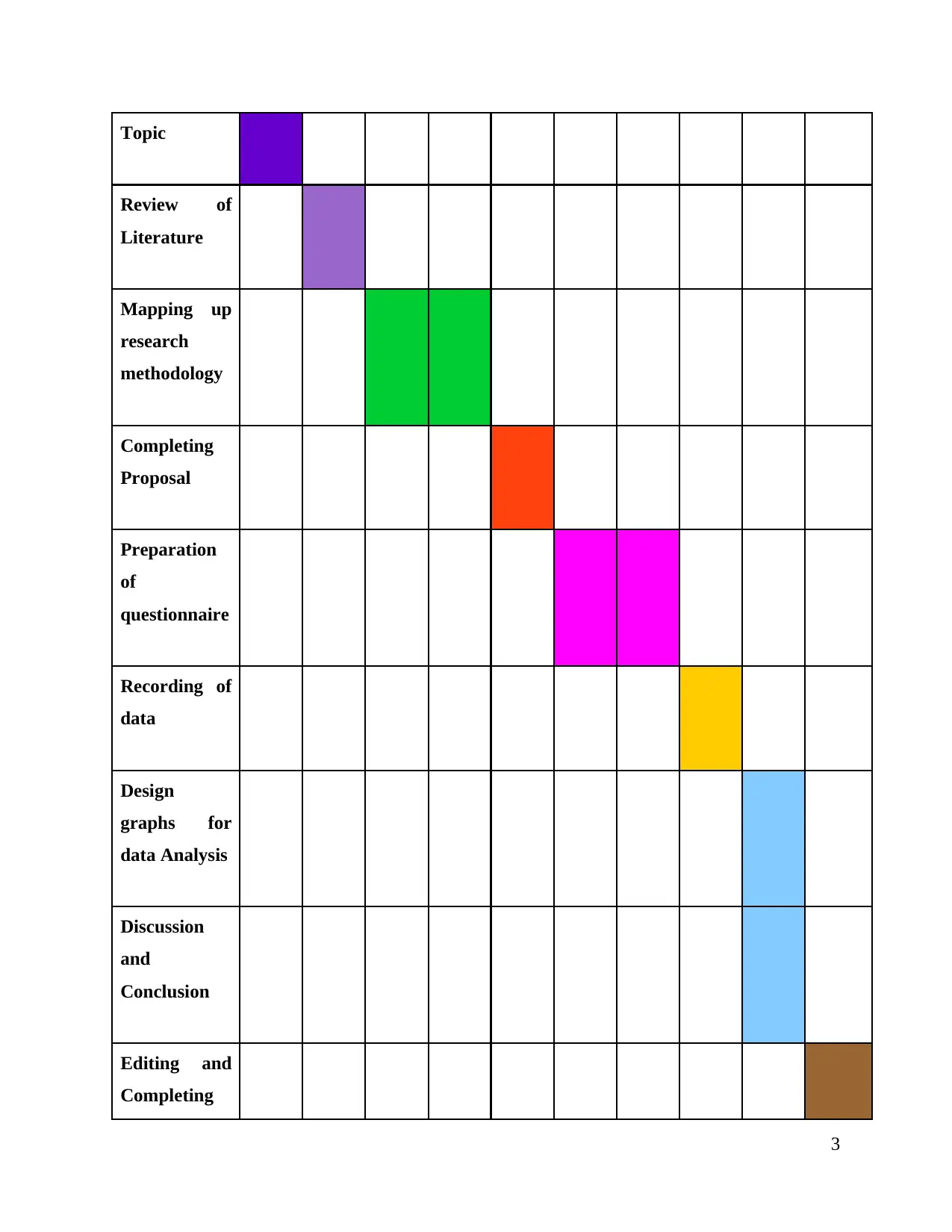
Topic
Review of
Literature
Mapping up
research
methodology
Completing
Proposal
Preparation
of
questionnaire
Recording of
data
Design
graphs for
data Analysis
Discussion
and
Conclusion
Editing and
Completing
3
Review of
Literature
Mapping up
research
methodology
Completing
Proposal
Preparation
of
questionnaire
Recording of
data
Design
graphs for
data Analysis
Discussion
and
Conclusion
Editing and
Completing
3
⊘ This is a preview!⊘
Do you want full access?
Subscribe today to unlock all pages.

Trusted by 1+ million students worldwide
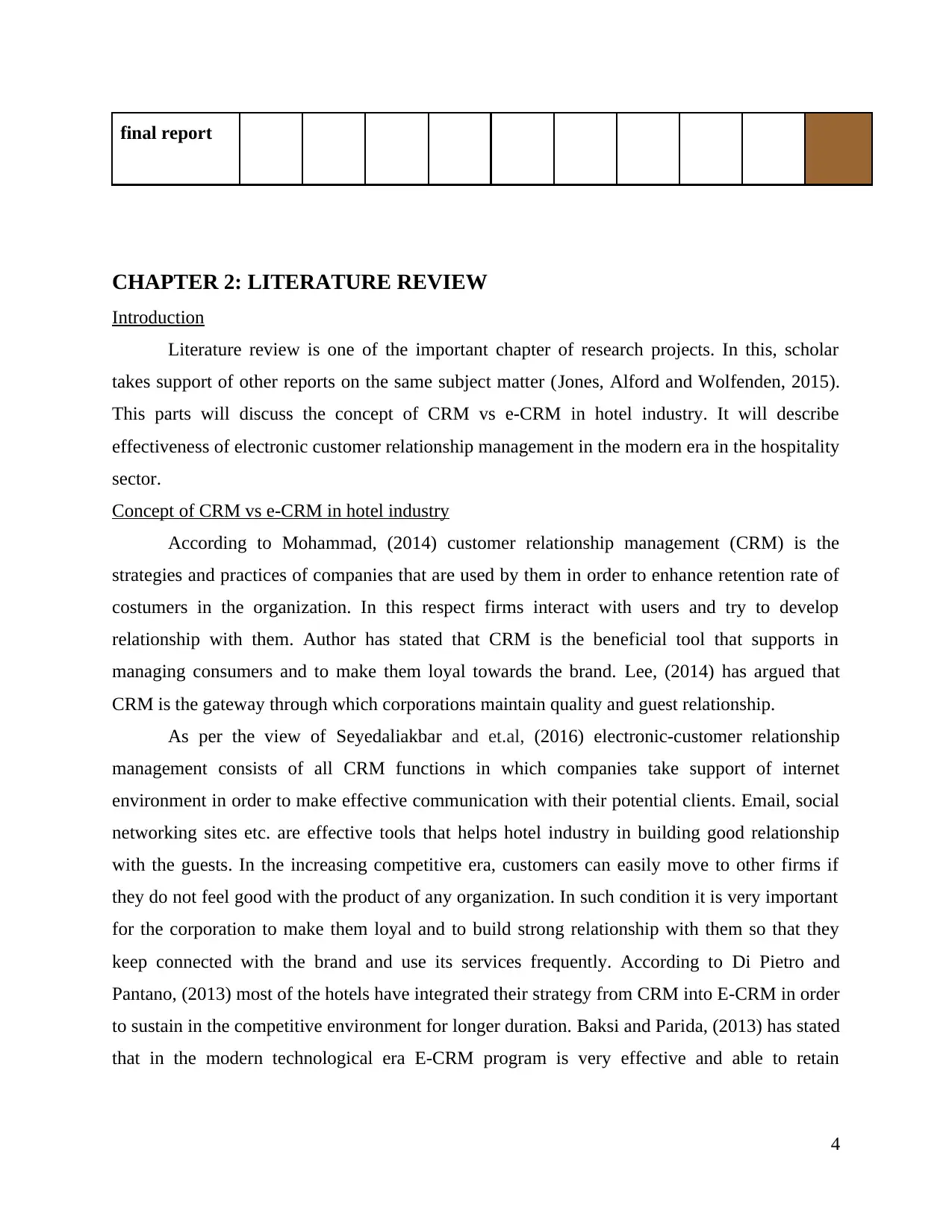
final report
CHAPTER 2: LITERATURE REVIEW
Introduction
Literature review is one of the important chapter of research projects. In this, scholar
takes support of other reports on the same subject matter (Jones, Alford and Wolfenden, 2015).
This parts will discuss the concept of CRM vs e-CRM in hotel industry. It will describe
effectiveness of electronic customer relationship management in the modern era in the hospitality
sector.
Concept of CRM vs e-CRM in hotel industry
According to Mohammad, (2014) customer relationship management (CRM) is the
strategies and practices of companies that are used by them in order to enhance retention rate of
costumers in the organization. In this respect firms interact with users and try to develop
relationship with them. Author has stated that CRM is the beneficial tool that supports in
managing consumers and to make them loyal towards the brand. Lee, (2014) has argued that
CRM is the gateway through which corporations maintain quality and guest relationship.
As per the view of Seyedaliakbar and et.al, (2016) electronic-customer relationship
management consists of all CRM functions in which companies take support of internet
environment in order to make effective communication with their potential clients. Email, social
networking sites etc. are effective tools that helps hotel industry in building good relationship
with the guests. In the increasing competitive era, customers can easily move to other firms if
they do not feel good with the product of any organization. In such condition it is very important
for the corporation to make them loyal and to build strong relationship with them so that they
keep connected with the brand and use its services frequently. According to Di Pietro and
Pantano, (2013) most of the hotels have integrated their strategy from CRM into E-CRM in order
to sustain in the competitive environment for longer duration. Baksi and Parida, (2013) has stated
that in the modern technological era E-CRM program is very effective and able to retain
4
CHAPTER 2: LITERATURE REVIEW
Introduction
Literature review is one of the important chapter of research projects. In this, scholar
takes support of other reports on the same subject matter (Jones, Alford and Wolfenden, 2015).
This parts will discuss the concept of CRM vs e-CRM in hotel industry. It will describe
effectiveness of electronic customer relationship management in the modern era in the hospitality
sector.
Concept of CRM vs e-CRM in hotel industry
According to Mohammad, (2014) customer relationship management (CRM) is the
strategies and practices of companies that are used by them in order to enhance retention rate of
costumers in the organization. In this respect firms interact with users and try to develop
relationship with them. Author has stated that CRM is the beneficial tool that supports in
managing consumers and to make them loyal towards the brand. Lee, (2014) has argued that
CRM is the gateway through which corporations maintain quality and guest relationship.
As per the view of Seyedaliakbar and et.al, (2016) electronic-customer relationship
management consists of all CRM functions in which companies take support of internet
environment in order to make effective communication with their potential clients. Email, social
networking sites etc. are effective tools that helps hotel industry in building good relationship
with the guests. In the increasing competitive era, customers can easily move to other firms if
they do not feel good with the product of any organization. In such condition it is very important
for the corporation to make them loyal and to build strong relationship with them so that they
keep connected with the brand and use its services frequently. According to Di Pietro and
Pantano, (2013) most of the hotels have integrated their strategy from CRM into E-CRM in order
to sustain in the competitive environment for longer duration. Baksi and Parida, (2013) has stated
that in the modern technological era E-CRM program is very effective and able to retain
4
Paraphrase This Document
Need a fresh take? Get an instant paraphrase of this document with our AI Paraphraser
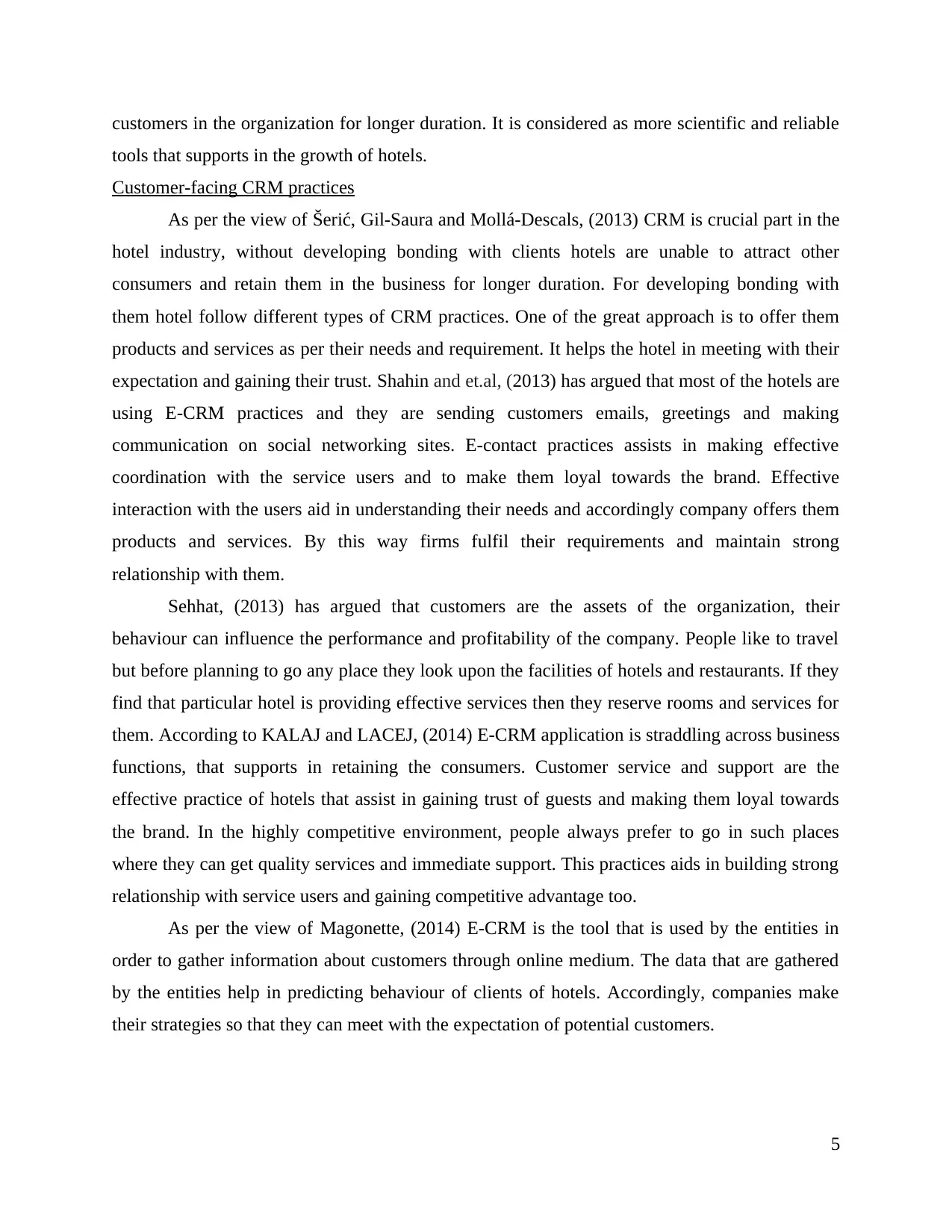
customers in the organization for longer duration. It is considered as more scientific and reliable
tools that supports in the growth of hotels.
Customer-facing CRM practices
As per the view of Šerić, Gil-Saura and Mollá-Descals, (2013) CRM is crucial part in the
hotel industry, without developing bonding with clients hotels are unable to attract other
consumers and retain them in the business for longer duration. For developing bonding with
them hotel follow different types of CRM practices. One of the great approach is to offer them
products and services as per their needs and requirement. It helps the hotel in meeting with their
expectation and gaining their trust. Shahin and et.al, (2013) has argued that most of the hotels are
using E-CRM practices and they are sending customers emails, greetings and making
communication on social networking sites. E-contact practices assists in making effective
coordination with the service users and to make them loyal towards the brand. Effective
interaction with the users aid in understanding their needs and accordingly company offers them
products and services. By this way firms fulfil their requirements and maintain strong
relationship with them.
Sehhat, (2013) has argued that customers are the assets of the organization, their
behaviour can influence the performance and profitability of the company. People like to travel
but before planning to go any place they look upon the facilities of hotels and restaurants. If they
find that particular hotel is providing effective services then they reserve rooms and services for
them. According to KALAJ and LACEJ, (2014) E-CRM application is straddling across business
functions, that supports in retaining the consumers. Customer service and support are the
effective practice of hotels that assist in gaining trust of guests and making them loyal towards
the brand. In the highly competitive environment, people always prefer to go in such places
where they can get quality services and immediate support. This practices aids in building strong
relationship with service users and gaining competitive advantage too.
As per the view of Magonette, (2014) E-CRM is the tool that is used by the entities in
order to gather information about customers through online medium. The data that are gathered
by the entities help in predicting behaviour of clients of hotels. Accordingly, companies make
their strategies so that they can meet with the expectation of potential customers.
5
tools that supports in the growth of hotels.
Customer-facing CRM practices
As per the view of Šerić, Gil-Saura and Mollá-Descals, (2013) CRM is crucial part in the
hotel industry, without developing bonding with clients hotels are unable to attract other
consumers and retain them in the business for longer duration. For developing bonding with
them hotel follow different types of CRM practices. One of the great approach is to offer them
products and services as per their needs and requirement. It helps the hotel in meeting with their
expectation and gaining their trust. Shahin and et.al, (2013) has argued that most of the hotels are
using E-CRM practices and they are sending customers emails, greetings and making
communication on social networking sites. E-contact practices assists in making effective
coordination with the service users and to make them loyal towards the brand. Effective
interaction with the users aid in understanding their needs and accordingly company offers them
products and services. By this way firms fulfil their requirements and maintain strong
relationship with them.
Sehhat, (2013) has argued that customers are the assets of the organization, their
behaviour can influence the performance and profitability of the company. People like to travel
but before planning to go any place they look upon the facilities of hotels and restaurants. If they
find that particular hotel is providing effective services then they reserve rooms and services for
them. According to KALAJ and LACEJ, (2014) E-CRM application is straddling across business
functions, that supports in retaining the consumers. Customer service and support are the
effective practice of hotels that assist in gaining trust of guests and making them loyal towards
the brand. In the highly competitive environment, people always prefer to go in such places
where they can get quality services and immediate support. This practices aids in building strong
relationship with service users and gaining competitive advantage too.
As per the view of Magonette, (2014) E-CRM is the tool that is used by the entities in
order to gather information about customers through online medium. The data that are gathered
by the entities help in predicting behaviour of clients of hotels. Accordingly, companies make
their strategies so that they can meet with the expectation of potential customers.
5
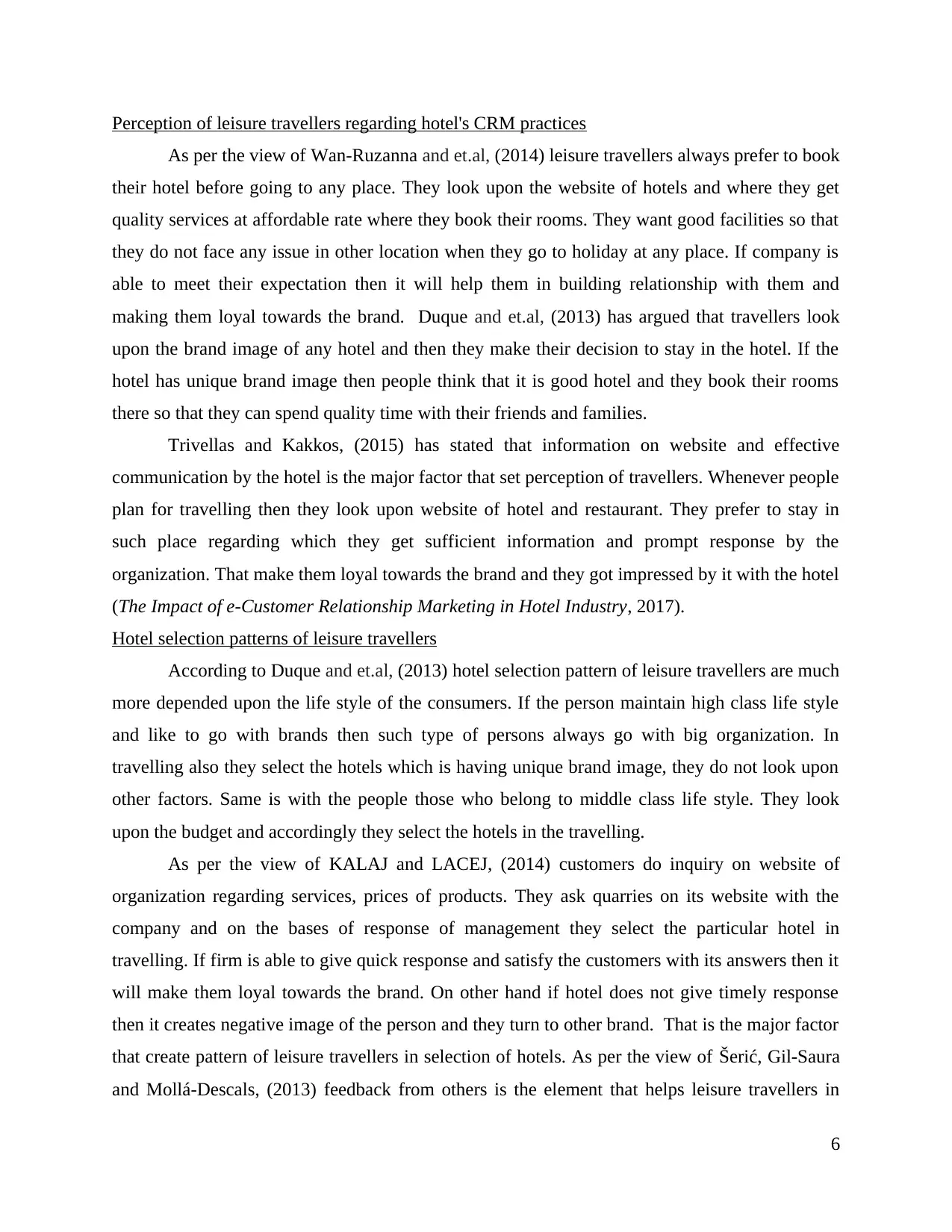
Perception of leisure travellers regarding hotel's CRM practices
As per the view of Wan-Ruzanna and et.al, (2014) leisure travellers always prefer to book
their hotel before going to any place. They look upon the website of hotels and where they get
quality services at affordable rate where they book their rooms. They want good facilities so that
they do not face any issue in other location when they go to holiday at any place. If company is
able to meet their expectation then it will help them in building relationship with them and
making them loyal towards the brand. Duque and et.al, (2013) has argued that travellers look
upon the brand image of any hotel and then they make their decision to stay in the hotel. If the
hotel has unique brand image then people think that it is good hotel and they book their rooms
there so that they can spend quality time with their friends and families.
Trivellas and Kakkos, (2015) has stated that information on website and effective
communication by the hotel is the major factor that set perception of travellers. Whenever people
plan for travelling then they look upon website of hotel and restaurant. They prefer to stay in
such place regarding which they get sufficient information and prompt response by the
organization. That make them loyal towards the brand and they got impressed by it with the hotel
(The Impact of e-Customer Relationship Marketing in Hotel Industry, 2017).
Hotel selection patterns of leisure travellers
According to Duque and et.al, (2013) hotel selection pattern of leisure travellers are much
more depended upon the life style of the consumers. If the person maintain high class life style
and like to go with brands then such type of persons always go with big organization. In
travelling also they select the hotels which is having unique brand image, they do not look upon
other factors. Same is with the people those who belong to middle class life style. They look
upon the budget and accordingly they select the hotels in the travelling.
As per the view of KALAJ and LACEJ, (2014) customers do inquiry on website of
organization regarding services, prices of products. They ask quarries on its website with the
company and on the bases of response of management they select the particular hotel in
travelling. If firm is able to give quick response and satisfy the customers with its answers then it
will make them loyal towards the brand. On other hand if hotel does not give timely response
then it creates negative image of the person and they turn to other brand. That is the major factor
that create pattern of leisure travellers in selection of hotels. As per the view of Šerić, Gil-Saura
and Mollá-Descals, (2013) feedback from others is the element that helps leisure travellers in
6
As per the view of Wan-Ruzanna and et.al, (2014) leisure travellers always prefer to book
their hotel before going to any place. They look upon the website of hotels and where they get
quality services at affordable rate where they book their rooms. They want good facilities so that
they do not face any issue in other location when they go to holiday at any place. If company is
able to meet their expectation then it will help them in building relationship with them and
making them loyal towards the brand. Duque and et.al, (2013) has argued that travellers look
upon the brand image of any hotel and then they make their decision to stay in the hotel. If the
hotel has unique brand image then people think that it is good hotel and they book their rooms
there so that they can spend quality time with their friends and families.
Trivellas and Kakkos, (2015) has stated that information on website and effective
communication by the hotel is the major factor that set perception of travellers. Whenever people
plan for travelling then they look upon website of hotel and restaurant. They prefer to stay in
such place regarding which they get sufficient information and prompt response by the
organization. That make them loyal towards the brand and they got impressed by it with the hotel
(The Impact of e-Customer Relationship Marketing in Hotel Industry, 2017).
Hotel selection patterns of leisure travellers
According to Duque and et.al, (2013) hotel selection pattern of leisure travellers are much
more depended upon the life style of the consumers. If the person maintain high class life style
and like to go with brands then such type of persons always go with big organization. In
travelling also they select the hotels which is having unique brand image, they do not look upon
other factors. Same is with the people those who belong to middle class life style. They look
upon the budget and accordingly they select the hotels in the travelling.
As per the view of KALAJ and LACEJ, (2014) customers do inquiry on website of
organization regarding services, prices of products. They ask quarries on its website with the
company and on the bases of response of management they select the particular hotel in
travelling. If firm is able to give quick response and satisfy the customers with its answers then it
will make them loyal towards the brand. On other hand if hotel does not give timely response
then it creates negative image of the person and they turn to other brand. That is the major factor
that create pattern of leisure travellers in selection of hotels. As per the view of Šerić, Gil-Saura
and Mollá-Descals, (2013) feedback from others is the element that helps leisure travellers in
6
⊘ This is a preview!⊘
Do you want full access?
Subscribe today to unlock all pages.

Trusted by 1+ million students worldwide
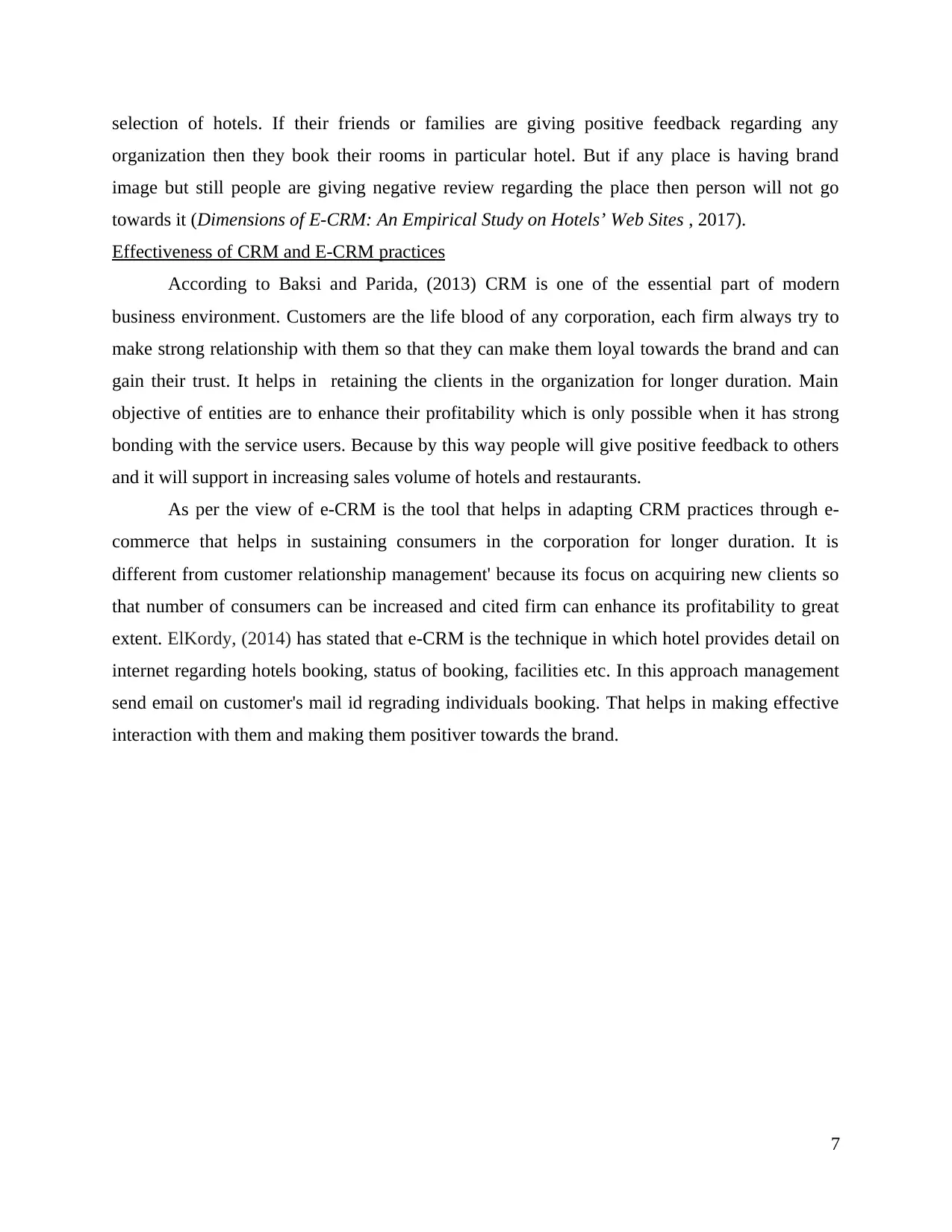
selection of hotels. If their friends or families are giving positive feedback regarding any
organization then they book their rooms in particular hotel. But if any place is having brand
image but still people are giving negative review regarding the place then person will not go
towards it (Dimensions of E-CRM: An Empirical Study on Hotels’ Web Sites , 2017).
Effectiveness of CRM and E-CRM practices
According to Baksi and Parida, (2013) CRM is one of the essential part of modern
business environment. Customers are the life blood of any corporation, each firm always try to
make strong relationship with them so that they can make them loyal towards the brand and can
gain their trust. It helps in retaining the clients in the organization for longer duration. Main
objective of entities are to enhance their profitability which is only possible when it has strong
bonding with the service users. Because by this way people will give positive feedback to others
and it will support in increasing sales volume of hotels and restaurants.
As per the view of e-CRM is the tool that helps in adapting CRM practices through e-
commerce that helps in sustaining consumers in the corporation for longer duration. It is
different from customer relationship management' because its focus on acquiring new clients so
that number of consumers can be increased and cited firm can enhance its profitability to great
extent. ElKordy, (2014) has stated that e-CRM is the technique in which hotel provides detail on
internet regarding hotels booking, status of booking, facilities etc. In this approach management
send email on customer's mail id regrading individuals booking. That helps in making effective
interaction with them and making them positiver towards the brand.
7
organization then they book their rooms in particular hotel. But if any place is having brand
image but still people are giving negative review regarding the place then person will not go
towards it (Dimensions of E-CRM: An Empirical Study on Hotels’ Web Sites , 2017).
Effectiveness of CRM and E-CRM practices
According to Baksi and Parida, (2013) CRM is one of the essential part of modern
business environment. Customers are the life blood of any corporation, each firm always try to
make strong relationship with them so that they can make them loyal towards the brand and can
gain their trust. It helps in retaining the clients in the organization for longer duration. Main
objective of entities are to enhance their profitability which is only possible when it has strong
bonding with the service users. Because by this way people will give positive feedback to others
and it will support in increasing sales volume of hotels and restaurants.
As per the view of e-CRM is the tool that helps in adapting CRM practices through e-
commerce that helps in sustaining consumers in the corporation for longer duration. It is
different from customer relationship management' because its focus on acquiring new clients so
that number of consumers can be increased and cited firm can enhance its profitability to great
extent. ElKordy, (2014) has stated that e-CRM is the technique in which hotel provides detail on
internet regarding hotels booking, status of booking, facilities etc. In this approach management
send email on customer's mail id regrading individuals booking. That helps in making effective
interaction with them and making them positiver towards the brand.
7
Paraphrase This Document
Need a fresh take? Get an instant paraphrase of this document with our AI Paraphraser
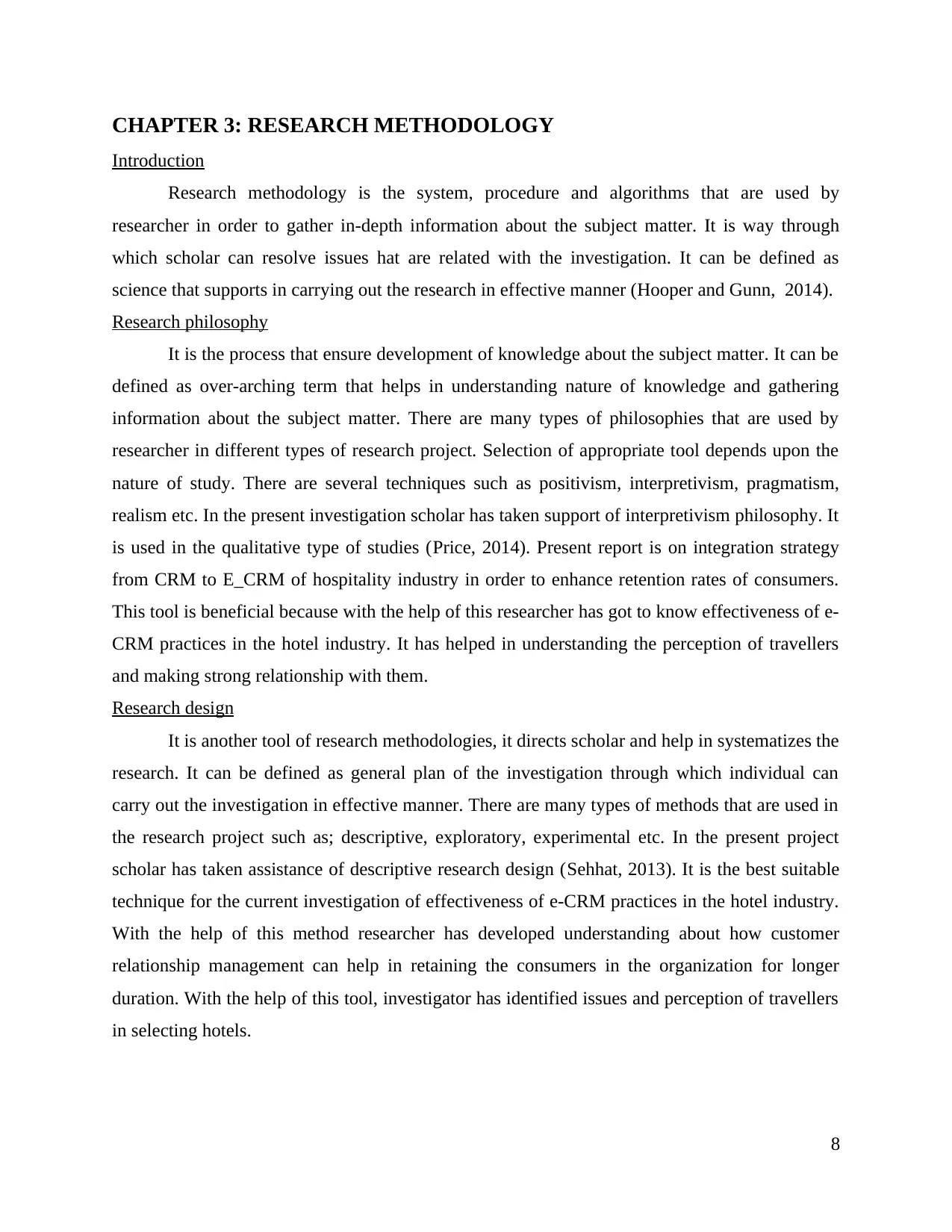
CHAPTER 3: RESEARCH METHODOLOGY
Introduction
Research methodology is the system, procedure and algorithms that are used by
researcher in order to gather in-depth information about the subject matter. It is way through
which scholar can resolve issues hat are related with the investigation. It can be defined as
science that supports in carrying out the research in effective manner (Hooper and Gunn, 2014).
Research philosophy
It is the process that ensure development of knowledge about the subject matter. It can be
defined as over-arching term that helps in understanding nature of knowledge and gathering
information about the subject matter. There are many types of philosophies that are used by
researcher in different types of research project. Selection of appropriate tool depends upon the
nature of study. There are several techniques such as positivism, interpretivism, pragmatism,
realism etc. In the present investigation scholar has taken support of interpretivism philosophy. It
is used in the qualitative type of studies (Price, 2014). Present report is on integration strategy
from CRM to E_CRM of hospitality industry in order to enhance retention rates of consumers.
This tool is beneficial because with the help of this researcher has got to know effectiveness of e-
CRM practices in the hotel industry. It has helped in understanding the perception of travellers
and making strong relationship with them.
Research design
It is another tool of research methodologies, it directs scholar and help in systematizes the
research. It can be defined as general plan of the investigation through which individual can
carry out the investigation in effective manner. There are many types of methods that are used in
the research project such as; descriptive, exploratory, experimental etc. In the present project
scholar has taken assistance of descriptive research design (Sehhat, 2013). It is the best suitable
technique for the current investigation of effectiveness of e-CRM practices in the hotel industry.
With the help of this method researcher has developed understanding about how customer
relationship management can help in retaining the consumers in the organization for longer
duration. With the help of this tool, investigator has identified issues and perception of travellers
in selecting hotels.
8
Introduction
Research methodology is the system, procedure and algorithms that are used by
researcher in order to gather in-depth information about the subject matter. It is way through
which scholar can resolve issues hat are related with the investigation. It can be defined as
science that supports in carrying out the research in effective manner (Hooper and Gunn, 2014).
Research philosophy
It is the process that ensure development of knowledge about the subject matter. It can be
defined as over-arching term that helps in understanding nature of knowledge and gathering
information about the subject matter. There are many types of philosophies that are used by
researcher in different types of research project. Selection of appropriate tool depends upon the
nature of study. There are several techniques such as positivism, interpretivism, pragmatism,
realism etc. In the present investigation scholar has taken support of interpretivism philosophy. It
is used in the qualitative type of studies (Price, 2014). Present report is on integration strategy
from CRM to E_CRM of hospitality industry in order to enhance retention rates of consumers.
This tool is beneficial because with the help of this researcher has got to know effectiveness of e-
CRM practices in the hotel industry. It has helped in understanding the perception of travellers
and making strong relationship with them.
Research design
It is another tool of research methodologies, it directs scholar and help in systematizes the
research. It can be defined as general plan of the investigation through which individual can
carry out the investigation in effective manner. There are many types of methods that are used in
the research project such as; descriptive, exploratory, experimental etc. In the present project
scholar has taken assistance of descriptive research design (Sehhat, 2013). It is the best suitable
technique for the current investigation of effectiveness of e-CRM practices in the hotel industry.
With the help of this method researcher has developed understanding about how customer
relationship management can help in retaining the consumers in the organization for longer
duration. With the help of this tool, investigator has identified issues and perception of travellers
in selecting hotels.
8
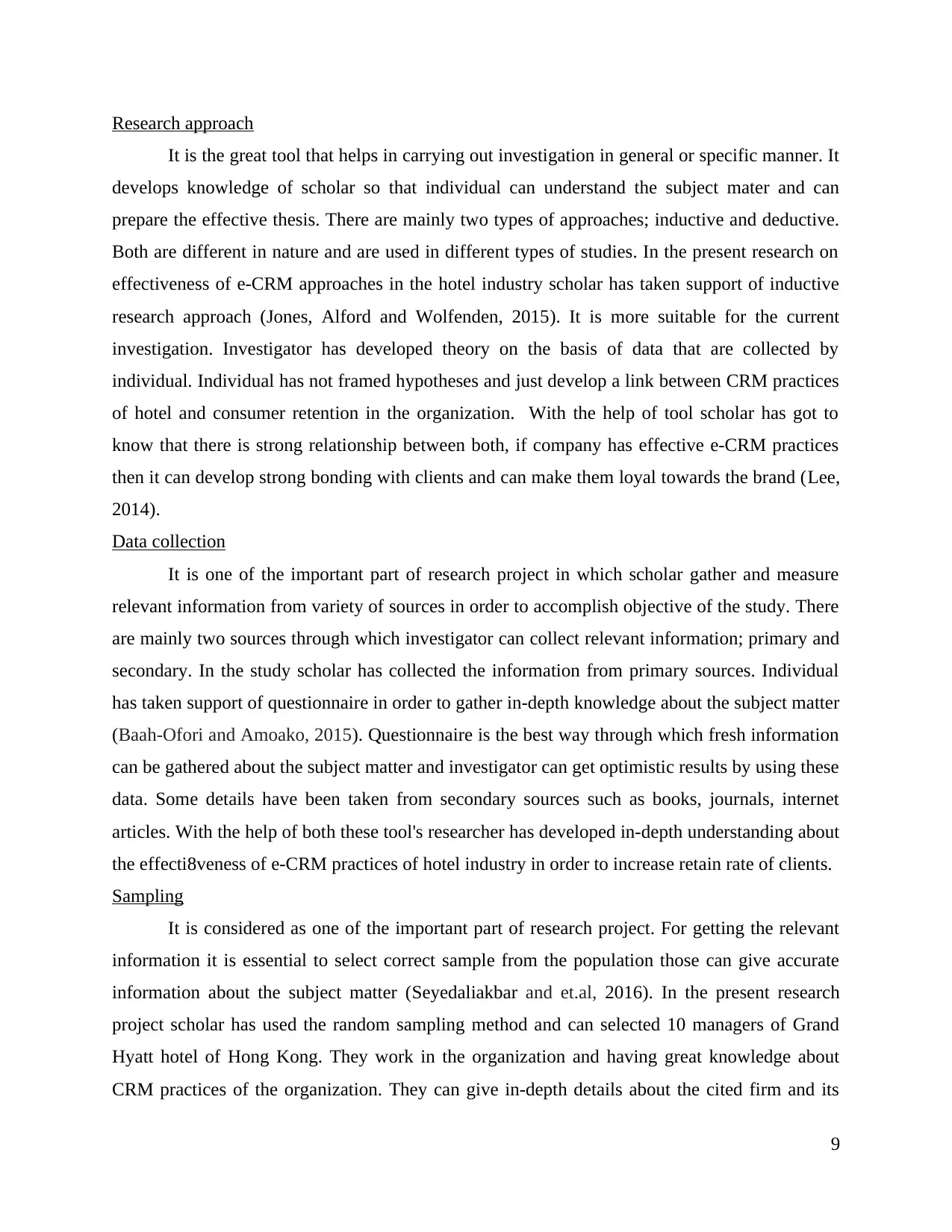
Research approach
It is the great tool that helps in carrying out investigation in general or specific manner. It
develops knowledge of scholar so that individual can understand the subject mater and can
prepare the effective thesis. There are mainly two types of approaches; inductive and deductive.
Both are different in nature and are used in different types of studies. In the present research on
effectiveness of e-CRM approaches in the hotel industry scholar has taken support of inductive
research approach (Jones, Alford and Wolfenden, 2015). It is more suitable for the current
investigation. Investigator has developed theory on the basis of data that are collected by
individual. Individual has not framed hypotheses and just develop a link between CRM practices
of hotel and consumer retention in the organization. With the help of tool scholar has got to
know that there is strong relationship between both, if company has effective e-CRM practices
then it can develop strong bonding with clients and can make them loyal towards the brand (Lee,
2014).
Data collection
It is one of the important part of research project in which scholar gather and measure
relevant information from variety of sources in order to accomplish objective of the study. There
are mainly two sources through which investigator can collect relevant information; primary and
secondary. In the study scholar has collected the information from primary sources. Individual
has taken support of questionnaire in order to gather in-depth knowledge about the subject matter
(Baah-Ofori and Amoako, 2015). Questionnaire is the best way through which fresh information
can be gathered about the subject matter and investigator can get optimistic results by using these
data. Some details have been taken from secondary sources such as books, journals, internet
articles. With the help of both these tool's researcher has developed in-depth understanding about
the effecti8veness of e-CRM practices of hotel industry in order to increase retain rate of clients.
Sampling
It is considered as one of the important part of research project. For getting the relevant
information it is essential to select correct sample from the population those can give accurate
information about the subject matter (Seyedaliakbar and et.al, 2016). In the present research
project scholar has used the random sampling method and can selected 10 managers of Grand
Hyatt hotel of Hong Kong. They work in the organization and having great knowledge about
CRM practices of the organization. They can give in-depth details about the cited firm and its
9
It is the great tool that helps in carrying out investigation in general or specific manner. It
develops knowledge of scholar so that individual can understand the subject mater and can
prepare the effective thesis. There are mainly two types of approaches; inductive and deductive.
Both are different in nature and are used in different types of studies. In the present research on
effectiveness of e-CRM approaches in the hotel industry scholar has taken support of inductive
research approach (Jones, Alford and Wolfenden, 2015). It is more suitable for the current
investigation. Investigator has developed theory on the basis of data that are collected by
individual. Individual has not framed hypotheses and just develop a link between CRM practices
of hotel and consumer retention in the organization. With the help of tool scholar has got to
know that there is strong relationship between both, if company has effective e-CRM practices
then it can develop strong bonding with clients and can make them loyal towards the brand (Lee,
2014).
Data collection
It is one of the important part of research project in which scholar gather and measure
relevant information from variety of sources in order to accomplish objective of the study. There
are mainly two sources through which investigator can collect relevant information; primary and
secondary. In the study scholar has collected the information from primary sources. Individual
has taken support of questionnaire in order to gather in-depth knowledge about the subject matter
(Baah-Ofori and Amoako, 2015). Questionnaire is the best way through which fresh information
can be gathered about the subject matter and investigator can get optimistic results by using these
data. Some details have been taken from secondary sources such as books, journals, internet
articles. With the help of both these tool's researcher has developed in-depth understanding about
the effecti8veness of e-CRM practices of hotel industry in order to increase retain rate of clients.
Sampling
It is considered as one of the important part of research project. For getting the relevant
information it is essential to select correct sample from the population those can give accurate
information about the subject matter (Seyedaliakbar and et.al, 2016). In the present research
project scholar has used the random sampling method and can selected 10 managers of Grand
Hyatt hotel of Hong Kong. They work in the organization and having great knowledge about
CRM practices of the organization. They can give in-depth details about the cited firm and its
9
⊘ This is a preview!⊘
Do you want full access?
Subscribe today to unlock all pages.

Trusted by 1+ million students worldwide
1 out of 29
Your All-in-One AI-Powered Toolkit for Academic Success.
+13062052269
info@desklib.com
Available 24*7 on WhatsApp / Email
![[object Object]](/_next/static/media/star-bottom.7253800d.svg)
Unlock your academic potential
Copyright © 2020–2026 A2Z Services. All Rights Reserved. Developed and managed by ZUCOL.


